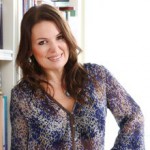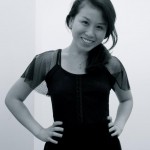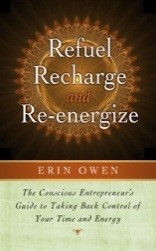Contributor: Alice Liu
Work and Life is a two-hour radio program hosted by Stew Friedman, director of the Wharton Work/Life Integration Project, on Sirius XM’s Channel 111, Business Radio Powered by The Wharton School. Every Tuesday from 7 to 9 PM EST, Stew speaks with everyday people and the world’s leading experts about creating harmony among work, home, community and the private self (mind, body and spirit).
On Work and Life, Stew Friedman spoke with Julie Smolyansky, President and CEO of Lifeway Foods. Smolyansky became the youngest female CEO of a publicly held firm at the age of 27. She spoke about how she became CEO of Lifeway Foods and how she implements Total Leadership concepts to integrate the different parts of her life.
The following are edited excerpts of their conversation:
Stew Friedman: Tell us the story of how you became the CEO of Lifeway Foods at such a young age.
Julie Smolyansky:  My family immigrated to America from the former Soviet Union in 1976. We were refugees and settled in Chicago. Through their entrepreneurial spirit, my parents founded a Russian food deli that eventually led to Lifeway Foods. They took the company public in 1988. For them, there was no work-life balance. I think it’s a nice luxury to be able to talk about it when you have all the resources and networks like we do now, but for an immigrant family it’s a little bit of a different conversation. My dad worked seven days a week. There were times when I really didn’t see him for months on end, because I’d go to sleep and he’d still be working, and I’d wake up and he’d already left for work. I saw my parents sacrifice quite a bit.
My family immigrated to America from the former Soviet Union in 1976. We were refugees and settled in Chicago. Through their entrepreneurial spirit, my parents founded a Russian food deli that eventually led to Lifeway Foods. They took the company public in 1988. For them, there was no work-life balance. I think it’s a nice luxury to be able to talk about it when you have all the resources and networks like we do now, but for an immigrant family it’s a little bit of a different conversation. My dad worked seven days a week. There were times when I really didn’t see him for months on end, because I’d go to sleep and he’d still be working, and I’d wake up and he’d already left for work. I saw my parents sacrifice quite a bit.
After I graduated college, I was in graduate school planning on being a psychologist. I had a bad experience in the field, so I asked my dad serendipitously for a part-time position in the company so I could finish grad school and reevaluate what I wanted to do. I saw how he was empowering people. I fell love with what he was doing. I left grad school after the first year and came to work for him full time in 1998. After all the years that I hadn’t seen him, I was reintroduced to my father as an adult, and it was really wonderful to establish a relationship with him.
Unfortunately on June 9, 2002 my father died of a sudden heart attack. It was a really traumatic experience for me. Not only was I mourning the loss of my father, the company at that point was earning about $12 million in annual revenue. We had about 70 employees and nationwide distribution. I knew that this was my father’s complete passion and everything that he had spent his life working for. I made a promise to him that I would do everything in my power to make sure that Lifeway not only succeeded, but that it thrived. The day that we learned my father had passed away, a handful of his friends were standing around in a circle within my earshot saying, “Sell your stock. This company is done. There’s no way that a girl can run this company.” That really pissed me off, to be honest, and it still fuels me every day.
SF: Earlier in the show I shared a story about how Daniel Murphy, the second baseman of the New York Mets, faced a great deal of criticism for taking paternity leave for the first few days of the season while his wife gave birth to their first child. What are your thoughts on this?
JS: We need to redefine what it means to be man in society. I think we need to raise boys to be empathetic so that they can be good partners and so that we have a balanced, fair society. When a father and a son are throwing around a baseball in the front yard, and you hear the father say, “Hey, you’re throwing like a girl,” what message is that sending to the boy, and what message is that sending to the girl next to him? When I had my babies, my husband was with me the entire time that I was in the hospital, and he really bonded. He not only was with me through that, but he left his family business to raise our children full-time so that I could continue to scale everything that I’m doing. I think it’s great that moms and dads and other kids see him in the hallways as much as they see me in the hallways at school.
SF: How did the change in the definition of your husband’s role change your family and your business?
JS: We had to make the decision of whose career we would propel forward, and we were at a point when Lifeway was really exploding, and he said, “You’re really good at what you’re doing. Keep doing that.” I have daughters, and we both thought it would be a really good thing for them to see this change in role models. The fact of the matter is that, like myself, he also missed his parents growing up when they were building their business. He said it’s been the joy of his life to be able to raise our daughters and be there for them. Again, when we talk about redefining what it means to be a man, he is living proof of that.
SF: What are some of the most useful strategies that you’ve discovered as the CEO of your company for how you can be truly effective in the different parts of your life given the pressures that you face?
JS: One of the greatest things I did was read your book Total Leadership, and I spent a day and a half with you five years ago when we were starting our family. One thing that really hit home for me was the idea that we should not be striving for “work-life balance” per se, but that instead, we have to integrate our careers, our selves, our families, and our communities into one overlapping circle. I’m not perfect at it, but I think about it a lot. I sometimes get three out of four integrated, and I’m happy with that.
SF: What are some of the things that you do?
JS: For example, it’s important for me to be fit and healthy. I’m a better leader when I’m able to run, so I run marathons. Not only do I run marathons, but I also talk about them in my work, and I try to lead by inspiring my team to take the time to invest in their own health. I also raise money for an organization called Every Mother Counts, which advocates for better maternal health. I integrated that messaging throughout the company in a campaign where we donated money to the foundation every time a customer bought a bottle of our Kefir. I did all of that in the workplace, and I was also running with the stroller. That was my time to share with my kids and show them the importance of exercise. Through running, I’m working and raising awareness on the campaign we’re building at Lifeway, and I’m working on my own health and myself.
SF: That’s what I call a four-way win. You’re hitting on all cylinders. You’re making things better for yourself, your family, your community, and your business all at once.
Smolyansky candidly discusses her viewpoints on paternity leave, the role her husband plays at home, and her strategies for integrating work and life as a female CEO. She also speaks about how discussing work-life integration is a luxury her parents never had as they tried to build their business when they first immigrated to America. Do you, your parents, or someone you know have an experience similar to Smolyansky’s parents, or do you think work-life integration is a “luxury” accessible to only relatively wealthier families? How do you think first-generation immigrants can achieve work-life integration amidst the sacrifices they must make to establish a life for their families in a new country? Join us in the comments section with your thoughts and experiences.
Join Work and Life next Tuesday, May 6 at 7 pm on Sirius XM Channel 111 for conversations with Peter McGraw about the role of humor at work and with Cali Yost whether telework is a concept that can work. Visit Work and Life for a full schedule of future guests.
ABOUT THE AUTHOR
 Alice Liu is an undergraduate senior studying Management at The Wharton School and English (Creative Writing) at the College of Arts & Sciences.
Alice Liu is an undergraduate senior studying Management at The Wharton School and English (Creative Writing) at the College of Arts & Sciences.
 Business Radio Powered by The Wharton School, Stew Friedman continued the discussion he began with Brett Hurt, on the seemingly-paradoxical benefits of slowing down at work in order to get more done, in a conversation with Erin Owen. Erin Owen is a performance breakthrough coach, which she describes as “a combination of an Eastern guru, a business coach, a life coach, a health coach, and a time management master.” She helps professionals and entrepreneurs apply the wisdom of ancient Eastern philosophical and energetic practices to modern, Western ideas of performance.
Business Radio Powered by The Wharton School, Stew Friedman continued the discussion he began with Brett Hurt, on the seemingly-paradoxical benefits of slowing down at work in order to get more done, in a conversation with Erin Owen. Erin Owen is a performance breakthrough coach, which she describes as “a combination of an Eastern guru, a business coach, a life coach, a health coach, and a time management master.” She helps professionals and entrepreneurs apply the wisdom of ancient Eastern philosophical and energetic practices to modern, Western ideas of performance.
 Liz Stiverson is a 2014 MBA candidate at The Wharton School.
Liz Stiverson is a 2014 MBA candidate at The Wharton School.